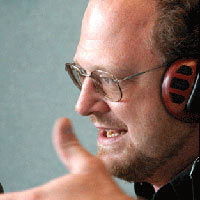The recent harsh weather has apparently caused a number of meters to fail, and consequently, the city has lost some all-important revenue.
In a letter to the committee, Floyd acknowledges that the receipt winders, coin receptors and keypads iced up due to the storm on Jan. 29. "After some use, and the sun melting the ice, all the meters became usable throughout the day," she writes.
It's the first winter for the LUKE machines.
The single-space meters also failed and the city did not enforce parking meter rules on Jan. 30 as a result.
Floyd defended the machines and the bidding process saying that bid specifications required a temperature ranged from -20 degrees Fahrenheit to 140 degrees and the LUKE machines have been installed in Alaska and Canada. She didn't say whether or not the LUKE machines actually worked well in Alaska or Canada.
The multi-space meters have been controversial from the start. The original city guidelines for bidding on the machines included a rule that they must be solar-powered; a good idea that would save the city money since they wouldn't have to be hooked up to the electrical grid ringing up the power meter. In most other cities they are solar. But that was changed at the last minute and caused at least one vendor to file a formal complaint to the city about its process, especially since at the time it was the only bidder on the project.
The vendor also complained that the bidding guidelines were so specific as to favor one company, accusing the DPW of "slanting" the bid with "proprietary specifications." The complaint also noted that the bid required no performance bond to protect the city in case the things didn't work, "highly unusual with so much money on the line," it reads, "why would the city do such a thing."
After some modifications to the proposal, the city chose Digital Payment Technologies.
Since then, other complaints have included the facts that the screens are hard to see and directions difficult to follow. One question that members of the committee should also ask Floyd is if the numbers designating the parking stall are broken off -- which is happening to more and more meters-how does a parker know what spot they are paying for?
Fun Raising Funds: Lawmakers weren't just busy contemplating the state budget in 2007, they were also active in gathering cash for their campaigns, says the Wisconsin Democracy Campaign. Legislators took in a record $3.86 million in contributions last year besting the 2005 total of $3.35 million.
As usual with the Democracy Campaign analysis, the math is quite detailed. WDC notes that $2.33 million came in the last half of the year when the Legislature was working on the budget. It also reports that lawmakers held 103 fundraisers between Feb. 14 when they got the budget and Oct. 23 when they finally approved it some 100 days after it was due.
The top fundraisers from the Milwaukee area in the state Senate include Alberta Darling, who raised $251,559 in 2007, Lena Taylor ($155,206), Ted Kanavas ($121,790). Top Assembly money raisers from Milwaukee include Pedro Colon ($85,998), Sheldon Wasserman ($85,883) and Robin Vos ($58,474). Darling and Wasserman are in a heated contest for her seat in the Senate, Taylor is running for county executive and Colon is running for Milwaukee City Attorney.
The state's leading constitutional officers were also busy on the fundraising circuit. Gov. Jim Doyle raised $942,038, Attorney General JB Van Hollen took in $208,802 and Lt. Gov. Barbara Lawton raised $6,985. Lawton's modicum of money shouldn't be a surprise since she's already said she is not running for re-election in 2010.
More pothole politics: Top brass in Milwaukee Department of Public Works are being called in to discuss the pothole situation in our town. Ald. Tony Zielinski wants DPW to come up with a plan within 90 days to explain to city fathers how "it will systematically and on an ongoing basis address the issue," according to his resolution.
Back to the Emerald Isle: Just in time for St. Patrick's Day, Milwaukee re-ups its sister city relationship with Galway, Ireland. At the behest of the most Irish of aldermen, Michael Murphy, the goal, according to the resolution is to "agree to collaborate for the mutual benefit of their communities by exploring educational, economic and cultural opportunities and to support and encourage opportunities for mutually beneficial practical exchanges in the fields of business, culture, health care, education and tourism."
An avid outdoors person he regularly takes extended paddling trips in the wilderness, preferring the hinterlands of northern Canada and Alaska. After a bet with a bunch of sailors, he paddled across Lake Michigan in a canoe.
He lives in Bay View.


